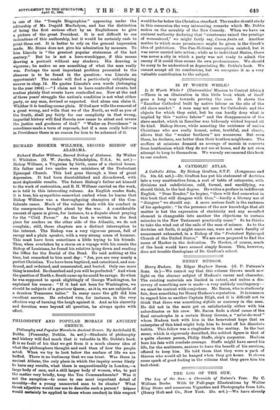PHILOSOPHY AND POPULAR MORALS IN ANCIENT GREECE.
Philosophy and Popular Morals in Ancient Greece. By Archibald E. Dobbs. (Ponsonby, Dublin. 5s. net.)--Students of philosophy and history will find much that is valuable in Mr. Dobbs's book. It is no fault of his that we get from it a much clearer idea of what the philosophers thought and said than of how the people acted. When we UT to look below the surface of life we are baffled. There is no testimony that we can trust. Was there in ancient Athens, the only place in which the inquiry seems likely to have any results, what there is unquestionably in London,—a large body of men, and a still larger body of women, who, to put the matter very briefly, keep the Ten Commandments? Was it not the exception—to come to one most important detail of morality—for a young unmarried man to be chaste? What Greek adjective would one use to describe such a person? 1,14pcer would certainly be applied to those whose conduct in this respect
would be far below the Christian standard. The reader should study in this connexion the very interesting remarks which Arr. Dobbs makes on the morality of the New Comedy. When we have an eminent authority declaring that "courtesans raised the prestige of womanhood," we might fairly say, Cause finite est. Another matter to which more prominence might be given is the Greek's idea of patriotism. The Pan-Hellenic conception existed, but it was never carried into action ; while as to individual States, there was never a city in which a party was not ready to admit the enemy if it could thus secure its own predominance. We should be sorry to be understood as depreciating Mr. Dobbs's book. We cannot accept all its conclusions, but we recognise it as a very valuable contribution to the subject.






















































 Previous page
Previous page